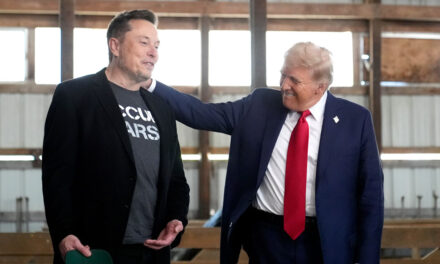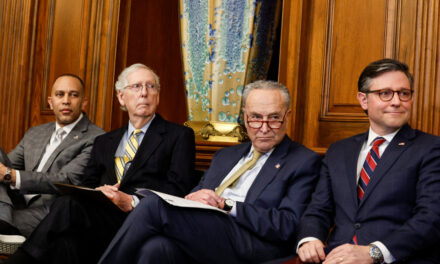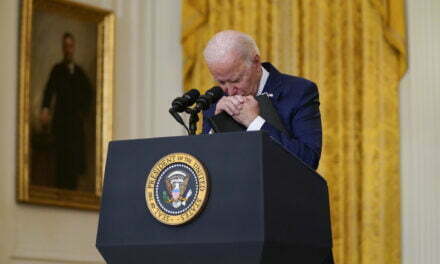
HORIST: Is Xi JinPing China’s Vladimir Putin?
When we look at the adversarial relationship between Russia and the United States today, we are reminded of the days of the Cold War when the two nations were involved in pervasive confrontation short of direct warfare.
We often forget that following the collapse of the Soviet Union, Russia was transformed into a more democratic nation with a friendly relationship with America. During the all-but-forgotten presidency of Boris Yeltsin, American and other western nation businesses flooded the old czarist empire. The two nations engaged in a range of cooperative activities, including Russo-American space exploration – which continues to this day. It was said that Russia – and communism – had been conquered by McDonalds.
Just as the moderate communist Mensheviks lost control of Russia to the hardline Bolsheviks after the Russian Revolution, the democratic forces of Yeltsin lost out to the hardline leadership of the former KGB operative, Vladimir Putin. With Putin’s ambition to reclaim major portions of Russia’s former evil empire and reassert Russian influence throughout the world, the relationship between Russia and America commenced a downward slide. If not a total Cold War, we have certainly entered a very chilly battle.
Following President Nixon’s successful overture to Chinese Chairman Mao ZeDong, China began a slow evolution to a more open and engaged society. Over time, the Middle Kingdom shed many of its doctrinaire communist policies. China developed a class of capitalistic businesses and gradually made investment and ownership easier for both citizens and foreign investors. Beijing eased the Maoist “Little Red Book” oppression of the masses and surrendered more decision-making powers to provincial and municipal governments. Except for the political-based Felon Gong, there was a measurable increase in religious freedom.
Consistent with the patient character of the Chinese culture, the changes in China were the result of evolution rather than revolution. As in the case of Russia, America and China developed – if not an allied relationship – a very friendly one. Again, American and western business flooded the country – buying, selling and investing. China and America even engaged in nominal joint military operations. They were less strategic than symbolic.
Then along came Xi.
Unlike the thuggish Putin personality, Xi is a charmer – affable. He is probably a lot smarter than Putin. But during his presidency, some of the gains of the past have started to ebb. While democracy – even in a limited form – was never part of China’s new economic and cultural policies, any modest gains in citizen influence eroded under Xi.
Perhaps the most visible evidence of the restoration of top-down authoritarianism was Xi “thoughts” being incorporated into the Chinese Constitution. While this concept is not well understood in the west, it has great meaning in China. It means that Xi is now the sole head of the government with virtually absolute authority for as long as he decides to exercise it. Though not as brutal and depraved as Stalin and Mao, Putin and Xi are as powerful as their predecessors ever were — and arguably even more powerful because their nations are no longer isolated.
Though that Little Red Book is a rare read anymore, Xi has moved to constrict personal freedom and counterpoint thinking. Alarmingly similar to our own enforced political correctness policies and restrictions on free speech, Xi has implemented a series of policies that set the parameters of legitimate thinking and action. He defines what “good Chinese” people must think – at least for public consumption.
Criticism of the Chinese leadership is again being criminalized to an extent not seen since Mao. There has been a crackdown on those who speak for greater democratic reforms. Those who do not embrace the statements and the policies of the “wise leaders” are increasingly subject to arrest and incarceration.
The crackdowns are most evident in those regions of China with the greatest forces of democratization exist – such as in the southwestern provinces as well as in Hong Kong, where Xi changed the rules to give Beijing more authority.
Even as the relationship with China improved, Xi has been reluctant – downright recalcitrant – in addressing Americas very real concerns over pirating intellectual property and the gross unfair trade agreements. Xi’s reluctance to respond is largely due to the fact that so many American administrations simply offered up lip-service complaints and they looked the other way.
There is both good news and bad news in the current situation. First, the good news. The possibility of a direct military confrontation with either Russia or China is virtually zero – although there always remains the continuation of proxy shooting wars with Russia, especially in the Middle East. This is not likely to happen with China. Outside of marginal sovereignty issues with Taiwan and a portion of the South China Sea, China does not engage in military expansionism like Putin’s Russia. They do not send soldiers all over the world.
For China, it is all about economic warfare and diplomatic influence. Unfortunately for the U.S., the Chinese approach stands a better chance of threatening American leadership than does the Russian military muscle. And that is the bad news. By our own policies and politics, we are losing world leadership to China.
One of the amazing things I frequently point out is that despite all of China’s oppression of its people, they love their country. They are among the most patriotic people in the world. They are proud of their culture and believe in Xi’s vision of China as the dominant nation in the world – toppling the United States. It is not that the people of China hate the United States. Quite the contrary. But, in terms of the competition for world leadership, they want their country to win. AND … they are aided and abetted by the rise of political left-wing liberalism in America that disrespects our leadership, abhors the free-market capitalism that made America the envy of the world and dredging up of our culture to slander the American Dream. And you wonder why the Chinese are winning?
So, there ‘tis.




























Tom, try again, you have a misread. I did not call your Felon Sex Abuser King, The Dumpster. I save…
That’s president Trump Not dumpster you asshole. You get pissed off when democrat asswipes gets called out.
Another chapter of True Republican Crime to balance what we found in The Dumpster where only one side of the…
Doubtless the local media suppressed the story during the campaign.
Part 12, black history month How about we look at the facts. The "author" has yet to tell us 1.…